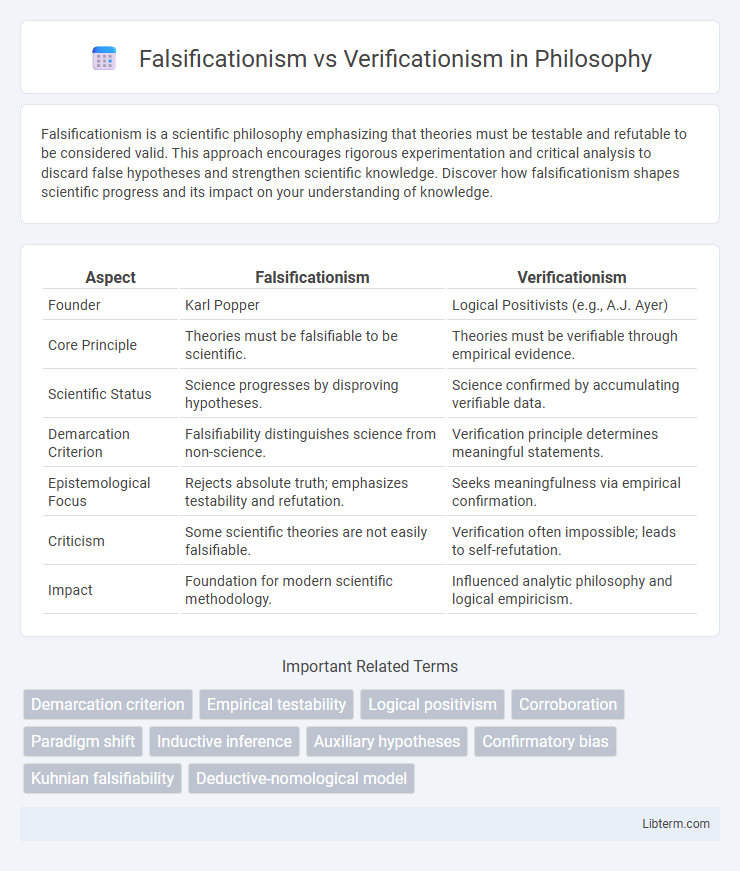Falsificationism is a scientific philosophy emphasizing that theories must be testable and refutable to be considered valid. This approach encourages rigorous experimentation and critical analysis to discard false hypotheses and strengthen scientific knowledge. Discover how falsificationism shapes scientific progress and its impact on your understanding of knowledge.
Table of Comparison
| Aspect | Falsificationism | Verificationism |
|---|---|---|
| Founder | Karl Popper | Logical Positivists (e.g., A.J. Ayer) |
| Core Principle | Theories must be falsifiable to be scientific. | Theories must be verifiable through empirical evidence. |
| Scientific Status | Science progresses by disproving hypotheses. | Science confirmed by accumulating verifiable data. |
| Demarcation Criterion | Falsifiability distinguishes science from non-science. | Verification principle determines meaningful statements. |
| Epistemological Focus | Rejects absolute truth; emphasizes testability and refutation. | Seeks meaningfulness via empirical confirmation. |
| Criticism | Some scientific theories are not easily falsifiable. | Verification often impossible; leads to self-refutation. |
| Impact | Foundation for modern scientific methodology. | Influenced analytic philosophy and logical empiricism. |
Introduction to Falsificationism and Verificationism
Falsificationism, pioneered by Karl Popper, asserts that scientific theories must be testable and refutable through empirical evidence, emphasizing the importance of falsifiability as a criterion for scientific legitimacy. Verificationism, rooted in the logical positivist movement, holds that a statement or theory is meaningful only if it can be empirically verified or is tautological. Both philosophies address the demarcation problem in the philosophy of science but differ fundamentally in their approach to the validation and testability of scientific knowledge.
Historical Background of the Philosophies
Falsificationism, developed by Karl Popper in the early 20th century, emerged as a response to the limitations of Verificationism, which was championed by the Vienna Circle and grounded in Logical Positivism during the 1920s and 1930s. Verificationism emphasized empirical verification as the criterion for meaningful statements, whereas Falsificationism argued that scientific theories cannot be conclusively verified but can only be rigorously tested and potentially falsified. This shift marked a pivotal evolution in the philosophy of science, emphasizing the provisional nature of scientific knowledge and the importance of critical testing over absolute verification.
Core Principles of Verificationism
Verificationism centers on the principle that a statement is meaningful only if it can be empirically verified through sensory experience or logical proof. This approach emphasizes the verification criterion of meaning, which asserts that the truth of a proposition must be demonstrable by observable evidence or analytic truth. Verificationism rejects metaphysical, ethical, and theological claims lacking empirical support, prioritizing scientific verification as the foundation for meaningful discourse.
Core Tenets of Falsificationism
Falsificationism, championed by Karl Popper, asserts that scientific theories must be inherently testable and refutable through empirical observation, emphasizing the principle of falsifiability as the demarcation criterion of science. This approach prioritizes bold conjectures that withstand rigorous attempts at falsification, thereby enhancing scientific progress through the elimination of false hypotheses. Unlike verificationism, which seeks confirmation of hypotheses, falsificationism regards the failure to falsify as provisional support, underscoring the tentative and evolving nature of scientific knowledge.
Key Philosophers: Popper vs The Vienna Circle
Karl Popper championed falsificationism, arguing that scientific theories must be inherently disprovable to be empirical and meaningful. The Vienna Circle, led by philosophers such as Moritz Schlick and Rudolf Carnap, advocated verificationism, emphasizing that a statement's meaning is grounded in its empirical verifiability. Popper criticized verificationism for its reliance on positive confirmation, asserting that no amount of observations can conclusively verify a theory, whereas a single counterexample can falsify it.
Scientific Method: Verification vs Falsification
Falsificationism emphasizes the scientific method's reliance on falsifiability, proposing that scientific theories must be testable and refutable through empirical evidence, ensuring rigorous scrutiny and progress in knowledge. Verificationism asserts that meaningful scientific statements must be verifiable through direct observation or logical proof, focusing on the accumulation of confirmatory instances. The debate between verification and falsification highlights contrasting approaches to demarcating scientific theories, with falsification offering a more robust criterion for scientific rigor by prioritizing the capacity to disprove hypotheses rather than solely confirming them.
Critiques and Limitations of Verificationism
Verificationism faces critiques for its reliance on empirical verification, which excludes meaningful statements that cannot be empirically tested, such as ethical or metaphysical claims. Critics argue that its strict criteria render many scientific hypotheses and theoretical constructs unverifiable, limiting its applicability in scientific inquiry. Furthermore, Verificationism struggles with the verification principle itself, which is neither empirically verifiable nor analytically true, undermining its own foundational premise.
Challenges and Criticisms of Falsificationism
Falsificationism, proposed by Karl Popper, faces challenges such as difficulty in demarcating scientific theories from non-scientific ones due to the complexity of falsifying some hypotheses. Critics argue that scientific theories often endure despite conflicting evidence because auxiliary hypotheses can protect the core theory from falsification, leading to issues like the Duhem-Quine problem. Furthermore, verificationists contend that falsification overlooks the importance of empirical confirmation and the gradual accumulation of supportive evidence in scientific progress.
Relevance in Modern Philosophy of Science
Falsificationism, championed by Karl Popper, emphasizes the critical testability of scientific theories by seeking potential refutations rather than confirmations. Verificationism, rooted in logical positivism, asserts that meaningful statements must be empirically verifiable to hold cognitive significance. In modern philosophy of science, falsificationism remains highly relevant for its pragmatic approach to scientific progress, promoting continuous hypothesis testing and revision, while verificationism's strict criteria have been largely challenged by the complexities of theory confirmation and the theory-ladenness of observations.
Conclusion: Impact on Scientific Progress
Falsificationism, proposed by Karl Popper, emphasizes the importance of refuting hypotheses to advance scientific knowledge, fostering critical testing and innovation. Verificationism, rooted in logical positivism, focuses on confirming hypotheses through observational evidence but faces challenges with universal generalizations and theory-ladenness. The impact on scientific progress is profound, as falsificationism promotes continuous refinement by eliminating false theories, while verificationism's reliance on positive proof can limit the scope of scientific inquiry.
Falsificationism Infographic

 libterm.com
libterm.com